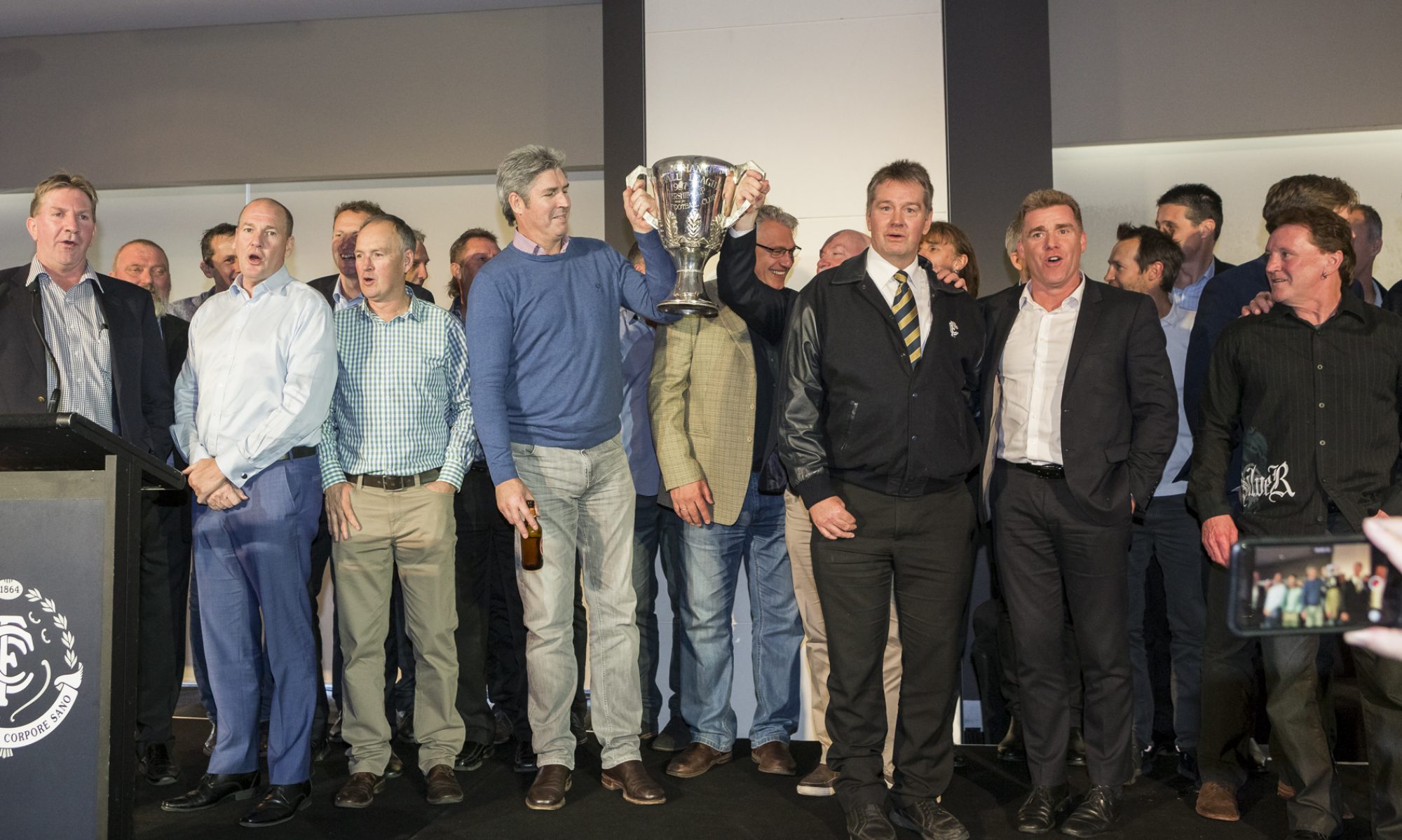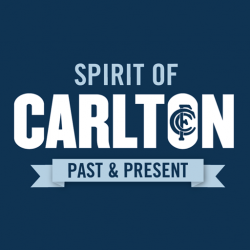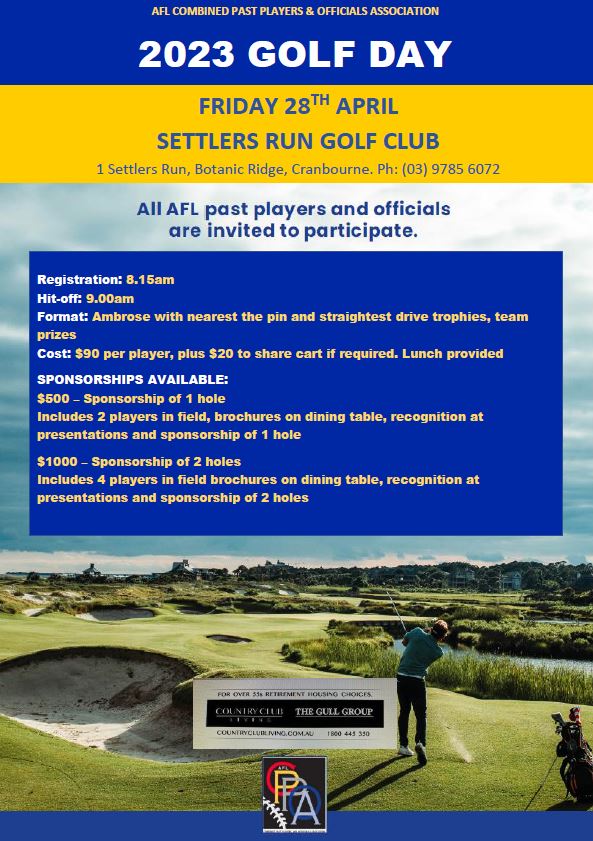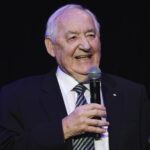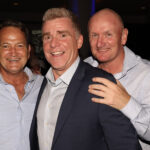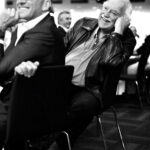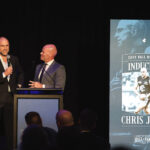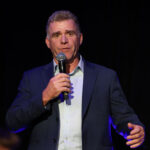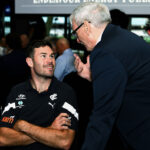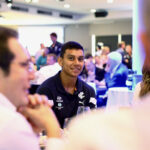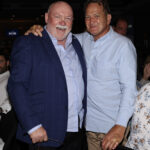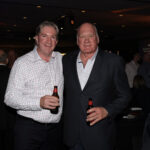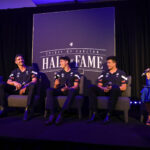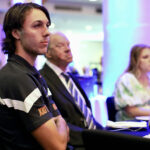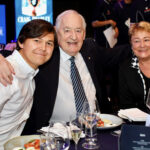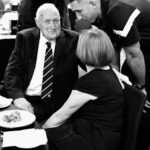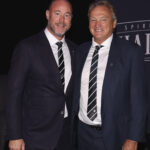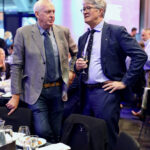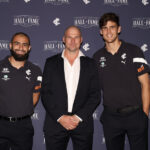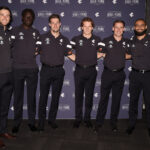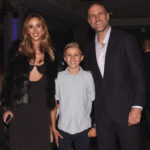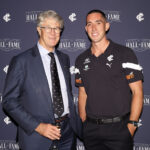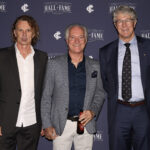Peter Dean 1989 – Latest Video
2023 ‘Parko’ Celebration of David Parkin
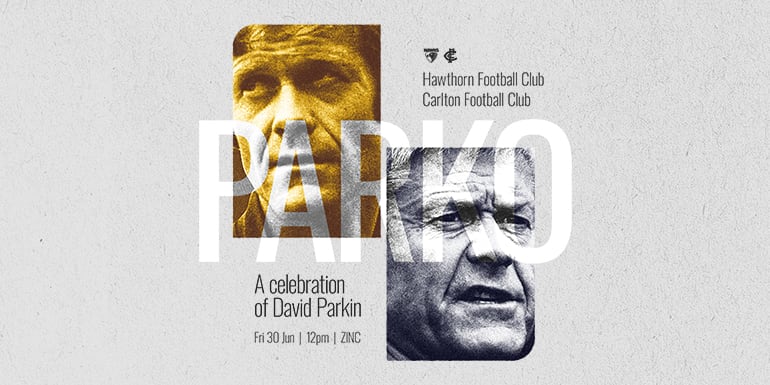
David Parkin is amongst the most respected figures across the Hawthorn & Carlton Football Clubs.
We invite you to come and celebrate his decorated career of five Premierships as both an outstanding captain and innovative coach.
General Tickets – $195
Includes a two-course lunch with beer, wine and soft drinks.
Gold Tickets – $395
Includes a two-course lunch with basic spirits, beer, wine and soft drinks, plus a signed memorabilia gift and premium seating.
Friday 30th June at ZINC, Federation Square
All proceeds for this event will be donated to the Hawthorn and Carlton Football Clubs ‘Past Players’ & Officials’ Associations.
Please note, all bookings are being taken through Hawthorn Football Club, however all proceeds will be shared equally by each clubs’ PPOA at the conclusion of the event.
CLICK HERE FOR TICKETS
Steve Da Rui 1989 – Latest Videos
Gerard Butts 1989 – Latest Video
Fraser Brown 1989 – Latest Video
Craig Bradley 1989 – Latest Video
Wayne Blackwell 1989 – Latest Video
Tom Alvin 1989 – Latest Video
Ian Aitken 1989 – Latest Video
AFLCPP 2023 Golf Day
Gofundme fundraising campaign for Bert Thornley
1970 premiership player, Bert Thornley has fallen on hard times.
Please visit and read the gofundme page set up to support him. Please, also tell your friends about this.
Life Members turn out in force on season’s eve
A record number of Carlton Life Members gathered at Kew Golf Club on the weekend.

A RECORD number of Life Members of the Carlton Football Club – from the oldest at 96 in former Club dentist Don Hall, through to the most recent recipient Andrew Mansour – gathered for the annual Life Members luncheon at Kew Golf Club.
More than 80 Life Members from as far back as the 1960s joined first-time attendees and guests in what was a laidback, informal affair with only one formality – the group photograph captured at luncheon’s end.
Thirty-seven premiership players – amongst them the four-time premiership greats Wayne Johnston, Peter Jones and David McKay – were there, together with 16 club best and fairests, including the five-time winner John Nicholls after whom the award is named and the Club’s 1994 Brownlow Medallist Greg Williams.
Prominent in attendance were a number of the Club’s more recent past players – including the 300-game dual John Nicholls Medallist and former captain Marc Murphy, the dual Coleman Medallist Brendan Fevola and the John Nicholls Medallist Heath Scotland (joined by his son Riley), together with Michael Jamison, Bret Thornton, Jarrad Waite, Simon Wiggins and Lance Whitnall.
2023 Life Members Luncheon gallery



Carlton CEO Brian Cook attended the luncheon, together with the club’s three-time premiership coach David Parkin. So too the dual Carlton premiership player Peter Bosustow, who recently jetted in from Perth with his wife Shelley.
Brian Kekovich, who booted four goals in the Club’s drought-breaking 1968 Grand Final victory over Essendon (the only decider won by a team with less goals kicked), also made the trek from his home in Western Australia and dined with Nicholls, his captain in that historic encounter. Kekovich was amongst the first-time luncheon attendees who were each presented with Life Membership certificates.
Apologies were received from Ron Barassi, Scott Camporeale, Ron De Iulio, Anthony Franchina, Adrian Gleeson, Matthew Hogg, Darren Hulme, Warren Jones, Trevor Keogh, Greg Lee, Phil Maylin, Val Perovic, Richard Newton, Malcolm Payne and Barry Stones.
The luncheon was organised by Frank Brosnan, Sharon McColl, Shane O’Sullivan and Stephen Gough, who acted as MC.
Fondly remembered were the Life Members who had recently passed away including Mario Bortolotto, Neil Chandler and Dennis Munari, who all attended last year’s luncheon.
The Carlton Football Club Life Members pictured in the 2023 team photo are as follows:

Standing left to right: Fraser Brown, Rod Austin, Peter Jones, Mark LoGiudice, Peter Bosustow (partially obscured), Peter Kerr, Mike Fitzpatrick, Andy Lukas, Peter Brown, Peter Newbold, Marcus Clarke, Andrew McKay, Tom Alvin, Grant Salomon (partially obscured), Anthony Koutoufides, Fraser Murphy, Ian Aitken, Andrew Mansour, Geoff Southby, Barry Gill, Justin Madden, Sam Salamone, Milham Hanna, Warren McKenzie (partially obscured), Michael Kennedy, David Rhys-Jones, Ivan Gutierrez, Michael Jamison, Stephen Kernahan, Wayne Gilbert, Lance Whitnall, Jarrad Waite, Sharon McColl, Phillip Pinnell, Vince Loccisano, Rohan Bromley, Lewis Bearman, David McKay, Peter McConville, Frank Brosnan, Craig Bradley.
Middle row: Shane O’Sullivan, Col Kinnear, Barry Armstrong, John Nicholls, Simon Wilson, David Nettlefold, Margaret Salomon, Don Hall, Marcus Rose, Laurie Carter, Robbert Klomp, Gordon Newton, Ray Gilbert, George Varlamos, Syd Jackson, Ian Wotherspoon, Alan Espie, Don Mathieson, David Parkin, Lionel Watts, Brian Kekovich, Ian Collins, Ken Hunter.
Front row: Stephen Gough, Shane Robertson, Bryan Quirk, Jim Buckley, Wayne Johnston, Alex Marcou, Greg Williams, Marc Murphy, Simon Wiggins, Heath Scotland, David Glascott.
Pictures from the Spirit of Carlton Hall of Fame 2023
Three inducted, two elevated to Legends of Carlton’s Hall of Fame
Blues celebrate a special night at the Hall of Fame.

THE CARLTON Football Club has incorporated three new inductees into its prestigious Hall of Fame – and elevated two to Legend status – in an event which attracted a 1000-strong audience to Marvel Stadium’s Victory Room.
Inducted was the Club’s 145-game former captain, three-time club Best and Fairest and 2010 Brownlow Medallist Chris Judd; its 176-game and 1987 Premiership rover Adrian Gleeson; and its 1945 and ’47 Premiership Coach and long-serving Vice-President Percy Bentley.
Judd and Gleeson (themselves former Club Directors) and Bentley (who died in office in his 26th year as Vice-President) now join the Hall’s 79 previous inductees, while Clover and Collins extend the Hall’s Legends from 14 to 16.
All five men served Carlton as Directors, with Clover the only man to serve the Club as Captain, Coach, Secretary, Vice-President and President
Established in 1987, the Carlton Football Club Hall of Fame recognises contributions made to the Club by individuals since 1864 and acknowledges each candidate’s outstanding service and overall contribution to the Club, as well as their individual record, ability, integrity, sportsmanship and character.
Members of the Club’s Heritage Committee consider a candidate’s outstanding service and overall contribution to Carlton in making its recommendation to the Board of Directors.
Committee persons may also consider a candidate’s individual record, ability, integrity, sportsmanship and character.

Gleeson and Judd at the 2023 Hall of Fame celebrations.
The number of games played or coached or years of administration and years of service are only a guide and not a determining factor.
Carlton President Luke Sayers acknowledged the seismic contributions of each of the Inductees and Legends – and although Bentley and Clover died in 1982 and 1984 respectively, they were represented by family members – Bentley by his son and one-game Carlton senior player Bruce, and Clover by his grandson Clark Morgan.
Judd, Gleeson and Collins all attended the Hall of Fame ceremony in person.
Earlier in the evening, the long-serving returning officer Andrew Mansour was honoured with Life Membership of the Club.
Carlton greats gather in memory of Munari
Former teammates come together to celebrate the life of Dennis Munari.

A HEALTHY gathering of some of the greatest Carlton players ever to lace a boot happened at the old ground on Sunday, for what was a touching farewell to the Blues’ 1968 Premiership player Dennis Munari.
Munari, the 41-game rover who died recently at the age of 74, was remembered as a great Carlton person who cared for the welfare of all former players, particularly in his capacity as the club’s Players’ Association President as a successor to the late Chris Pavlou more than 20 years ago.
In attendance at the farewell were six of Munari’s ’68 Premiership teammates – Adrian Gallagher, Peter Jones, John Nicholls, Ian Robertson, Bryan Quirk and Robert Walls, together with David McKay, Phil Pinnell, Andy Lukas, Geoff Southby, Rod Austin, Jim Buckley, Wayne Johnston, Alex Marcou and Warren Jones – Carlton Premiership players one and all in the years that followed.

Phil Pinnell and Peter Bedford.
Brownlow Medallists Gordon Collis and Peter Bedford also attended; as did former Carlton footballer Peter Fyffe, former Collingwood players Rene Kink and Des Tuddenham, North Melbourne Premiership player John Burns; former Carlton Football club directors Marcus Rose and George Varlamos; former Carlton football operations managers Geoff Walsh and Col Kinnear; Carlton Life Member David Nettlefold; former Australian Test batsman Keith Stackpole; and John Wrout, the son of the former Carlton Premiership player and Chairman of Selectors Jack Wrout.
Together they supported Dennis’ wife Sue, daughters Renee and Lauren, brother Adrian and all members of the Munari family in celebrating a wonderful life. A nice moment occurred when a football carrying the signatures of the 1968 Premiership players, Munari included, was availed to family members to photograph for posterity. The football was donated to the club some years ago by Paul Stewart, whose late father Lindsay had kept the item safely in storage for more than 50 years.
Nicholls, Walls and Southby, each introduced by Spirit of Carlton Manager Shane O’Sullivan, offered touching tributes to the man they knew.

Warren Jones.
After thanking Munari’s old matchday opponents for showing their respects to the Munari family in attending the service, Nicholls acknowledged Munari’s commitment to the welfare of his fellow former players – in keeping with the club’s time-honoured tradition of looking after its own.
“I only spoke to John Goold this morning, and ‘Gooldy’ told me Dennis always rang him to make sure he was okay – and that was the case with many other players with Dennis,” Nicholls said.
“I loved him, we all loved him and it is sad . . . but it’s important now to move forward and celebrate all the good things about Dennis, who was a great Carlton man.”
Walls acknowledge the presence in the room of so many Carlton people, as well as those from outside the club who shared companionships with Munari and respected the man. He then shareD his own reminiscences, which included an explanation as to why Munari had long been nicknamed ‘Shark’.
“It’s 56 years ago can you believe that Dennis and I made our debuts for Carlton in 1967,” Walls said, “and I’ve got fond memories of Dennis because he was 18 and I was 16, and he had two things I didn’t have – he had a car and he had a licence.
“The car that he had was a Holden from the ’50s and it’s front grill had been in a few crashes and smashes, so there was metal and steel going at all angles and it actually looked like a shark was coming at you – hence the nickname ‘Shark’ Munari.
“I got in that car for two years because Dennis drove me home to Brunswick after every training session. Many a time I’d say ‘let me out here. It’s just a walk down to my place’, but he’d insist on dropping me off at the front door … these are the things that you never forget.”

Keith Stackpole.
Of those halcyon years with Munari at Princes Park, Walls said “I guess you could say we were living the dream”.
“How good was it to be playing for Carlton? We had had the biggest name in football as our coach in Ron Barassi, and we had the best captain in the game in John Nicholls, and we had older players like ‘Serg’ (Sergio Silvagni), ‘Loftsy’ (Wes Lofts), Johnny Goold, Barry Gill, and so on. All of a sudden we were playing in the best team in the competition and that was pretty special.”
Beyond the playing arena, and in his summation of Munari’s character, Walls alluded to the kindness.
“I remember Dennis for his gentle nature,” Walls said.

Renee Munari is photographed by her daughter Sibel with a football signed by Ron Barassi and the 1968 Carlton Premiership players, her late father Dennis included.
“I remember him for being caring, considerate and respectful . . . he was a pretty special person. Everyone in this room will miss him, none of us will forget him and we’ve all been enriched for the experiences with him.”
Apologies were accepted from a number of former Carlton Premiership players unable to attend the farewell, including Bill Bennett (1968) and Bert Thornley (1970), who from afar acknowledged all that Munari had done for them as past players – and Adrian Munari, on behalf of the Munari family, offered his sincere thanks to the Carlton Football Club and the Spirit of Carlton thanked.
As he said: “Dennis adored his family and he adored the Carlton Football Club just as much”.
1968 Premiership Player Dennis Munari passes
Dennis Munari, a member of Ron Barassi’s drought-breaking Premiership 20 of 1968, has died at the age of 74.

ORIGINALLY domiciled in Seymour and a boarder at Kilmore’s Assumption College in the days of Peter Crimmins, Kevin Heath and Peter Keenan, Munari was recruited to Carlton under zoning laws after his father relocated to north suburban Thomastown.
In a podcast interview with this reporter and Tony Moclair for the club back in May 2018, Munari revealed that he had no real aspiration to play the game at the highest level.
“I was a mad Essendon supporter,” Munari said. “As a kid living in Seymour and all the way through College I barracked for Essendon, and living in the country I never thought I’d play League football to be honest.”
Munari first broke into the Carlton senior team for the first of his 41 senior appearances in the 8th round match of 1967, against Geelong at Princes Park. Named 20th man, and emerging from the dugout in the last quarter to replace Kevin Hall, Munari, saw the game’s two greatest followers John Nicholls and Graham ‘Polly’ Farmer go at it.
Munari’s place in club history was assured in that meritorious Grand Final victory over Essendon, earned with less goals kicked (7.14-8.5). Dame Fortune had smiled upon Munari. Though a knee complaint had ruled him out of the final two home and away matches of ’68 and the ensuing second semi-final, Munari earned a Grand Final call-up as a replacement for Ian Nicoll, who got hurt in the semi. Ironically, Nicoll would take Munari’s place at selection on that last Saturday in September 1969.

On Grand Final day 1968, Munari, as second rover to Adrian Gallagher, was named in a forward pocket alongside Brian Kekovich – the ultimate matchwinner for the Blues with four telling goals in a low-scoring affair cruelled by windswept conditions. Gallagher, a three-time Carlton Premiership player and club best and fairest, described Munari as “a real beauty”.
“Dennis was one of my best friends. He was a very popular clubman, very well-liked, and he loved Carlton. He was right up with it in terms of today’s Carlton and he and I would talk about the team and how the players were faring every week.
“He played well in the ’68 Grand Final, although I felt a bit guilty about how long I kept him off the ball. I used to tell him and ‘Barass’ that Dennis would have made a better centreman because first rovers tend to be selfish, so I couldn’t believe he was still my mate.”
Munari’s last game for the Blues – the Round 22 contest with Melbourne on the MCG – came on the afternoon Alex Jesaulenko made Carlton history in booting his 100th goal for the season. In recently-discovered 8mm film footage of the moment ‘Jezza’ kicked the ton, Munari, in the No.8 guernsey, can be seen shielding Jesaulenko from the marauding masses.

Munari initially signed with East Perth for season 1971, but weeks later was coerced into captaining and coaching Hobart when a former Carlton teammate Bert Thornley requested an early release from his Hobart playing contract. Regrettably, Munari’s 18 months in the role ended with his sacking in mid-1972, and by year’s end he was back in Melbourne and chasing the leather for the Carlton reserves.
In 1973 Munari joined VFA outfit Preston; then in 1974, following a chance meeting with Barassi (now the North Melbourne Senior Coach), he resolved to play on at Arden Street. At North he managed 13 senior appearances, twice took out the club’s reserve grade best and fairest honours, and supported Under 19s coach Ray ‘Slug’ Jordon as an assistant.
Munari’s time at North ended with the team’s comprehensive victory over Collingwood in the 1977 Grand Final replay. He had watched on as his former Carlton Premiership teammate and lifelong friend Brent Crosswell again played his part in landing the pennant for the great Ronald Dale.
A financial planner by profession, Munari for many years worked out of an office above the old University Hotel on the corner of Lygon and Grattan Streets – coincidentally the site of where the first annual general meeting of the Carlton Football Club was held in 1865.
Munari’s great love for Carlton endured well-beyond his playing days. An active member of the then Carlton Past Players Association from 1989, he assumed the Presidency in 2003 and served diligently as the association morphed into the Spirit of Carlton. He was quite literally part of the Carlton neighbourhood, and was regularly seen in the idyllic surrounds of Princes Park, completing his afternoon walks with his pet dog.
Munari was recently diagnosed with pancreatic cancer and subsequently suffered a heart attack. He died in palliative care at St Vincent’s Hospital on Wednesday (February 1).

The passing of Dennis Munari has also coincided with the loss at age 59 of Paul “Beaver” Buckley, the younger brother of Carlton’s three-time Premiership player and club Best and Fairest Jim.
Jim for many years looked out for his brother, a true character of the club fondly remembered by the likes of Stephen Kernahan and his contemporaries. The 1987 Premiership player Warren McKenzie, in acknowledgment of Paul’s passing, tweeted: “One of life’s great blokes. He was always around, but never did much other than laugh and joke. [He] introduced me to ouzo and coke to avoid hangover, (but) it didn’t work. Sad news”.
“He (Paul) came down from Kyneton after I established myself down here,” Jim said. “I got him a job at the meatworks in Preston through Dicky Mehrton, and he later worked with Orlando Luciano at the Footscray Wholesale Fruit and Vegetable market. He was an integral member there.

“At Carlton he became part of the club, and he fronted for a lot of the training sessions and the pleasant Sunday mornings. He helped out as a statistician, became good friends with the trainers and all the players loved him.
Paul passed away on Tuesday night (January 31) after a long illness. As Jim explained, he had a few heart problems and COVID wasn’t good to him”.
“He was a unique character. There was only one of him,” Jim said. “He was totally reliable and as honest as the day is long. He loved life, the Carlton Football Club and all its characters – and he was a character himself.”
Woodvale to honour a Carlton and Australian colonial-era sporting hero
Henry Frederick (‘Harry’) Boyle is to have a central Victorian oval named in his honour, some 115 years after his passing.

A FORMER Carlton footballer from colonial days is to have a central Victorian oval named in his honour, some 115 years after his passing.
The player, Henry Frederick (‘Harry’) Boyle, represented Carlton in 16 matches through its premiership season of 1874 and also served the Club as a committeeman. The Australasian of June 1895 also notes that Boyle was Carlton’s first delegate to the Football Association.
Significantly, Boyle was one of the most important and influential Australian cricketers of the 1870s and 1880s. He represented Victoria and Australia as its 17th Test cricketer – and in 1882 at The Kennington Oval famously took the final match-winning wicket against England which led to the creation of The Ashes.
The ground identified as the future Harry Boyle Oval is the Woodvale Recreation Reserve located about 14 kilometres north of Bendigo and a short drive from neighbouring Eaglehawk. The area was known as Sydney Flat at the time Boyle spent his formative years there in the 1850s and ’60s. While the oval’s genesis was undoubtedly the result of a community effort, Boyle is credited as leader of a group of youths who worked tirelessly to get the oval completed in time for the 1863 cricket season.
Driving the initiative to name the oval is Matt Thompson, who relocated to the area from Melbourne some 21 years ago. Thompson learned about Boyle’s connection to the oval from Bendigo historian Peter MacIver, who is researching a proposed book about Harry Boyle.
The Boyle family came to the goldfields from Sydney in 1853. Harry’s father, Daniel had a successful spell looking for gold and later settled in Sydney Flat where he established the Australian Store/Hotel. The premises was on the main road and very close to where the oval was positioned a few years later.
Shortly after Boyle’s death in December 1907, Dave Scott (Boyle’s lifelong friend and business partner) penned a memorial article for The Referee about Harry. Scott described how in 1857 or 1858 he had first heard of Boyle as “a wonderful boy cricketer whose bowling was causing great havoc amongst the stumps”. Following a successful spell playing for Sydney Flat (on the oval he helped create) Harry joined the ‘big’ club in Bendigo, the Bendigo United Cricket Club (BUCC). Such was Boyle’s progress that in season 1865/’66 (at 19 years of age) he was selected to play for Bendigo against a strong Victorian team. Boyle took 4-11 and 4-9 with Bendigo winning by an innings and seven runs.
During the off-seasons between 1872 and ’74, Boyle chased the oval ball for Sandhurst. In July 1873 he was named by the Bendigo Advertiser in a squad of footballers selected to meet Melbourne at the Kangaroo Flat Cricket Ground. While it is not clear if Boyle turned out for that game, a report in The Australasian from July 1872 described him as exhibiting fine play in a game for Sandhurst against South Yarra.
Boyle’s continued form for the BUCCs kept him on the radar of the big metropolitan teams and following a fine performance in a Colts match against a strong Melbourne CC team in the 1871—72 season he was invited to play for the East Melbourne Cricket Club by Alfred E Clarke. For a couple of years Boyle would travel to Melbourne each weekend (full expenses paid) to play for the Jolimonters. In 1874 he moved to Melbourne permanently, eventually becoming the third captain of the EMCC.
Boyle was primarily a cricketer and one of the most important events in his cricketing life occurred just prior to his permanent move to Melbourne. In December 1873 Boyle became the first man to bowl WG Grace when he played for Victoria against the Leviathan’s touring English XI. Scott described how Boyle, “. . .with a faster ball than usual, with a slight break from leg, beat the champion and clean bowled his middle stump”. Scott souvenired the ball Boyle used and it now resides in the Australian cricket museum at the MCG.
Boyle’s success against Grace established him as one of Victoria’s leading bowlers. He became a regular fixture in the Victorian XI and was also a selector for many years. Between 1872 and 1888 he played for Victoria in 28 first-class matches taking 62 wickets at an average of 19.56, while with the bat he accumulated 614 runs at an average of 12.03 from 51 innings. Boyle also captained the Vics in the inter-colonial games of 1875, 1879 (twice), 1881, 1882 and 1887.
Boyle’s connection with the Carlton Football Club can be sourced to 1874 when he represented the senior 20 as a defender throughout the season. The newspapers were generally positive about Boyle’s play in ’74, although one report has the umpire and Boyle being ‘hooted’ at by a mob over a disallowed goal in a game against Albert Park. Boyle was supposed to have touched the ball just before it passed the goal line, depriving Albert Park of victory.

Members of the Carlton team in 1874.
It appears that Boyle stopped playing football at the top level beyond the 1874 season as his name is not recorded on team lists for the Carlton first or second 20s for competitive matches.
A football first – the charging of admission at the gate – occurred on Boyle’s watch in 1875, after Edward Jackson, a friend of Boyle’s from the BUCC days, lost his sight and use of his hands in a mining accident. Through Boyle, Carlton and Melbourne agreed to charge patrons a cost of sixpence to view their third match of the season at the University Cricket Ground. In all, £106 was taken at the gate and after expenses, a sum of £97 3s 4d was handed to the Jackson family. This amount, along with other monies raised in Sandhurst, enabled the family to start a small business and escape the potential of poverty due to Edward’s injury.
Boyle’s last on-field involvement with the Carlton senior 20 appears to have occurred in June 1877. The following year he assisted John Conway in identifying the Victorian players for the national team which embarked on a tour of the Australian colonies.
Off the field, Boyle was also involved with football affairs, as Carlton’s first delegate to the Football Association. He was also a member of the football club’s committee of management in 1875, 1876 and 1877.
Following the successful Australian XI tour of 1878, Boyle established the Boyle and Scott’s Cricket, Football and Sports Warehouse, which hugely impacted upon Victorian and Australian Cricket in the 1880s.
Boyle became one of the most famous players in the cricketing world and with the constant demands of arranging tours and touring this period appears to have marked the end of his active involvement in football – although in August 1889 he did appear in an old boy’s match for Carlton against Geelong to raise money for the Geelong Hospital.
Boyle toured England with Australian cricket teams as a player in 1878, 1880, 1882, 1884 and 1888 and as manager in 1890. Renowned as an exceptionally accurate medium pacer with a deadly leg break, Boyle and the legendary Frederick Spofforth formed the greatest bowling combination of the age – as exemplified in 1878 when they dismissed a powerful MCC side at Lords for 33 and 19, to set up the tourists’ nine-wicket win. As famously, the pair (through their bowling) were largely responsible for the famous win at Kennington Oval in 1882 which gave birth to the Ashes legend. W G Grace wrote of Boyle that he “had a rare head on his shoulders and was often successful in getting batsmen out when other bowlers equally as good had tried and completely failed”.
Following the closure of Boyle and Scott in 1892 and time in Queensland and Tasmania, Boyle returned to work for the Victorian Government as Inspector of Tracks based in Walhalla. After he was retrenched from this position he became Collector for the Melbourne Benevolent Asylum, a position he filled until his death in 1907.
Boyle clearly never lost his love of football and Carlton. On 21 September 1907, having been released from hospital following major surgery, Boyle fronted up to the Melbourne Cricket Ground to see Jack Worrall’s Carlton overwhelm South Melbourne to secure the second of three consecutive League premierships. A number of reporters remarked favourably of his attendance on Grand Final, but barely two months later Boyle was gone.
Shortly after attending the football match, Boyle travelled to Bendigo to stay with his brother-in-law for the purpose of further recuperating from the operation. He quickly relapsed and was taken to Nurse McKinnon’s Private Hospital where he died on 21 November 1907. Boyle, a lifelong smoker, died from oesophageal cancer.
Boyle and his wife Margaret Wilson Scott had no children, and it also appears that his two sister’s families have also died out. On the other hand, Boyle was descended from two first fleeters (one a convict and one a marine) and a glance at the First Fleet website indicates that there are thousands of Australians with blood connections to him.
MacIver, who greatly assisted in the research for this article, is a retired teacher of Literature, English and History. He assisted Richard Cashman and Ric Sissons with research for their book, Billy Murdoch: Cricketing Colossus and is currently working on a proposed book about Boyle.
MacIver’s interest in Boyle stems from pieces he wrote for the Bendigo Advertiser a number of years ago. Through his research for a proposed book on Boyle, he came into contact with Matthew Thompson and informed him of the Boyle connection to the oval at Woodvale.

The Woodvale Recreation Reserve, hopefully to be renamed Harry Boyle Oval.
“Matthew and I are both keen to try and gain Harry Boyle the recognition he deserves and while I have helped Matthew with information and contacted a few people the success in getting the oval renamed has been largely down to his efforts.”
Thompson’s interest in Boyle was based on his own passion for cricket, given his family connection with sports equipment manufacturer Kookaburra Sport, which was established in Melbourne by Alfred Grace (AG) Thompson in 1890.
But he was mindful too of Boyle’s Carlton connection – which he hopes will stimulate further interest at a ground which has not seen a football match staged there since 1970.
Spirit of Carlton and Carlton Football Club 2023 Hall of Fame
Don’t miss your chance to celebrate Carlton’s newest Hall of Fame inductees.

PAST and current Carlton Football Club players will come together to honour the newly inducted members of the Hall of Fame.
Held in the Victory Room at Marvel Stadium on Wednesday 1 March 2023, this unmissable event now held at night will be jam packed with past and current Carlton players.
The evening will provide you with the opportunity to mingle with former, present-day players and coaches, while enjoying a delectable two-course dinner and premium beverages.
Merging our Guernsey Club and Carltonians Pre-season event will provide the opportunity for our Player Sponsors to sit with their sponsored players.
Along with this our newest Guernsey Club offering will now allow for past players to be sponsored within the program, where a benefit of this is to have the opportunity to sit with your sponsored past player at this event.
To find out more about the Past Player Sponsorship offering, Click here.
Function details:
Date: Wednesday 1 March, 2023
Time: 6 – 10pm
Location: Victory Room, Marvel Stadium
Dress Code: Smart Casual
Tickets are on sale now but are limited! Click here to secure your place now!
Former Blues big man passes away
Ruck/forward Chris Mitchell passes away aged 75.

THE FORMER ruckman/forward Chris Mitchell, who died last Saturday (November 26) at the age of 75, managed just five senior games for Carlton in what was Ron Barassi’s final season as senior coach.
But the first of them was one to remember.
Mitchell, the former Geelong Grammarian, was a member of the Cats’ 1967 Grand Final twenty. He made the move to Princes Park in mid-1971 after completing the second of two stints (and 48 games in total) at Kardinia Park. The Geelong years sandwiched Mitchell’s 1969 and ’70 seasons with Western Australian club East Perth, during which time he represented WA at the 1969 Adelaide carnival.
Wearing the No.9 of current Carlton Captain and reigning Brownlow Medallist Patrick Cripps, Mitchell got the call-up for the 15th Round, co-incidentally against the Cats at the old Carlton ground – and he more than vindicated Barassi’s selection.
In a high-scoring affair, Mitchell and Alex Jesaulenko each contributed five goals to the Blues’ emphatic victory, 21.15 (141) to 15.14 (104). Which prompted The Sun’s on-the-spot reporter Bob Crimeen, to write afterwards: “Would Geelong have beaten Carlton at Princes Park on Saturday if a fortnight ago the Cats had not cleared big Chris Mitchell to the Blues? Unfortunately, this question will never be answered. But if you said ‘yes’, there is strong statistical evidence to support your belief”.

Mitchell turned out for the next four Carlton games – St Kilda at Moorabbin Oval, South Melbourne at Princes Park, Footscray at the Western Oval and finally Richmond at Princes Park – and at 24 years of age never played League football again.
Mitchell’s wife of 40 years, Mandie, believed her husband’s decision to give the game away was both football and work-related.
“He had trouble being told what to do, but he and Ron (Barassi) remained good friends,” Mandie said.
“At the time he also got a job in the mines through BHP, I think in Gove (in the north-eastern corner of Arnhem Land), and he remained with BHP until around 1983 or ’84 – during which time he took two years off to complete an MBA at Harvard.
“Later he worked for Parbury Henty grainmillers, ironically out of BHP House in Melbourne, and he found further work afterwards.”
Geoff Southby, the Carlton Best and Fairest winner in his maiden season of 1971, and a former teammate of Mitchell’s, remembered him as “a good bloke and a good footballer in his short time with the Blues”.
So too the four-time Premiership player David McKay.
“Given that ‘Nick’ (John Nicholls) and ‘Perc’ (Peter Jones) were there in ’71, it was a bit unusual that the club went for another ruckman, but Chris was a pretty good player before he came to Carlton,” McKay said.
“He was fairly athletic, he had the physique and he had the football smarts, but he wasn’t egotistical. He was a nice guy to go with it.”
Mitchell discovered the presence of three separate cancers back in March, and while Mandie conceded her husband knew his time was limited, he never let on.
“Chris was incredibly brave. He was a very strong man.”
Chris Mitchell, Carlton’s 830th senior player since the maiden VFL season of 1897, died in Geelong’s Epworth Hospital.
He is survived by Mandie and sons James and Edward – “one blessed with Chris’s athletic ability, the other with his intuitive sense of football” to quote his beloved wife.
The Carlton senior team, including Chris Mitchell on debut, v Geelong – R15, Saturday, July 10, 1971
B: John O’Connell Geoff Southby Vin Waite
HB: Barry Gill David McKay Kevin Hall
C: Garry Crane Bill Barrot John Warden
HF: Ian Robertson Robert Walls (vc) Bryan Quirk
F: Chris Mitchell Alex Jesaulenko Brian Walsh
R: John Nicholls (c) Sergio Silvagni Adrian Gallagher
Res: Phillip Pinnell Trevor Keogh
Coach: Ron Barassi
